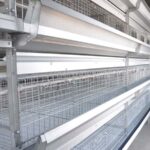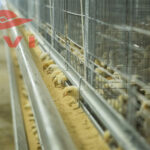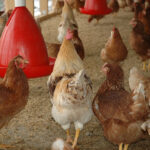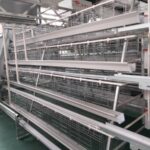What is the cause of the high ammonia concentration in winter chicken houses?
Many chicken farmers say that the ammonia content of the chicken house is high, but the harmful gas is not the most likely to breed in the high temperature and high humidity environment. Why is the winter cold and dry, the ammonia in the chicken house is often more serious? For this problem, below we Let’s first understand how ammonia gas appears in Poultry Equipment for Sale.
Reasons for less ammonia in summer
In a high-temperature and high-humidity environment, feces and other substances in the house are more susceptible to deterioration, resulting in a large amount of ammonia and other harmful gases. Summer is hot and humid, and there are more harmful gases. However, in the summer, the chicken farmers often do a good job of ventilation, so the ammonia problem is solved naturally, even if it is, the harm is not as great as winter.
Reasons for more ammonia in winter
In winter, the temperature is lowered, and the chicken farmers are worried that the chickens will be frozen and frozen. Therefore, they tend to shrink and shrink in ventilation, which makes them difficult to remove harmful gases such as ammonia. In addition, winter chicken houses are also to be well insulated, but also to ensure certain humidity conditions. Although it is difficult to say that it is high temperature and high humidity, it still leaves room for the generation of harmful gases. In this case, it is difficult to ensure ventilation, so the problem of harmful gases such as ammonia in winter is often more serious.

Method for preventing the increase of ammonia gas
1, ventilation and ventilation, the best way to prevent ammonia is to do ventilation. Of course, some cases of abnormal increase in ammonia often indicate problems in the health of the intestines of the flock. In fact, the main source of ammonia gas is chicken feces. The less the chicken absorbs the feed, the more nutrients are not digested in the feces, the chickens have problems with the intestines, and the digestibility of the feed is lower. .
2. Clean up the feces in time
Reduce the risk of ammonia, in addition to ventilation, pay attention to the gut health of the chickens and timely clean up the stool and litter.
3. Control the density of culture
The breeding density in the chicken house should not be too large, and the fermentation bed is generally 6-8 per square meter.
4, add biological agents
Adding the appropriate amount of Jinbao to promote the deodorant in the feed can improve the digestion and utilization of the protein, reduce the conversion of protein to ammonia and amine, and reduce the excretion of nitrogen in the feces.
The above is about the reasons for the increase of ammonia in winter chicken houses and the prevention methods. As a harmful gas, ammonia gas will not only harm the growth of chickens, but also cause a large number of chickens to die. Therefore, chicken farmers must Attention in poultry cage manufacturer in china.












